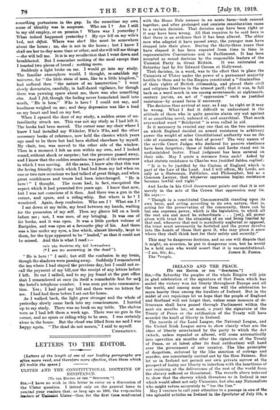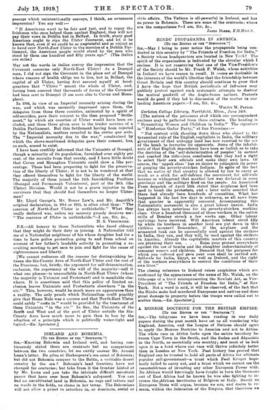IRELAND AND THE PEACE.
[To THE EDITOR, OP THE " SPECILTOR."1
Six,—On Saturday the peoples of the whole Empire will join in glad celebration of the signature of that Peace which has sealed the victory won for liberty throughout Europe and all the world, and among none of them will the celebration be more hearty than among the loyalists of Ireland. But in the midst of our rejoicings let us hope that the people of England and Scotland will not forget that, unless some measure of de- liverance shall have passed through Parliament within the next six months (or, at most, a year) the signature of the Treaty of Peace or the ratification of the Treaty will have sounded the knell of liberty in Ireland.
The records of the Land League, the National League, and the United Irish League serve to show clearly what are the ideas of liberty entertained by the party to which the Act (which, unless repealed or altered, will come automatically into operation six months after the signature of the Treaty of Peace, or at latest after its final ratification) will hand over the government of our country. The like principles of despotism, enforced by the like sanction of outrage and murder, are consistently carried out by the Sinn Feiners. But let us in Ireland not permit our own private sorrow at the prospect of losing our liberty to interfere with the heartiness of our rejoicing at the deliverance of the rest of the world from the slavery suffered or threatened. The records above referred to show that the slavery which threatens us in Ireland is one which would affect not only Unionists, but also any Nationalists who might refuse accurately to " toe the line."
May I venture M call your attention to a passage in one of the two splendid articles on Ireland in the Spectator of July 5th, a
passage which unintentionally conveys, I think, an erroneous impression? You say well:- " If Americans want to be fair and just, and to repay the Irishmen who ance helped them against England, they will not pay their vows in Dublin but in Belfast. In truth, every good American ought to sign the Ulster Covenant, and let it be known that, even if we could be so ungrateful and so unjust as to hand over North-East Ulster to the mercies of a Dublin Par- liament, the American people would stand by the men who stood by them one hundred and fifty years ago." (The italics are mine.) May net the words in italics convey the impression that the Covenant concerns only North-East Ulster? As a Donegal man, I did not sign the Covenant in the place out of Donegal where reasons of health oblige me to live, but in Belfast, the capital of all Ulster, having first assured myself at head- quarters that "Ulster " meant the whole of Ulster, and, having been assured that thousands of forms of the Covenant had been sent to Donegal (I am sure also to Cavan and Mona- ghan).
In 1916, in view of an Imperial necessity arising during the war, and which was earnestly impressed upon them, the delegates from those three counties, animated by a spirit of self-sacrifice, gave their consent to the then proposed "Settle- ment," by which six counties of Ulster would have been ex- cluded, and these three given over to the tender mercies of a Dublin Parliament. But this Settlement leaving been rejected by the Nationalists, matters reverted to the status quo ante. The " Imperial necessity due to the war," constrained by which the above-mentioned delegates gave their consent, has, as such, ceased to exist.
I have been credibly informed that the Unionists of Donegal, though a minority of its population, furnished over eighty per cent, of the recruits from that county, and I have little doubt that Cavan and Monaghan Unionists could show a like per- centage. These had been preparing to fight for the preserva- tion of the liberty of Ulster; it is not to be wondered at that they offered themselves to fight for the liberty of the world. The majority of them joined the 11th Inniskilling Fusiliers (Donegal and Fermanagh Volunteers), part of the 36th (the Ulster) Division. Would it not be a grave injustice to the survivors that they should find themselves no longer Ulster- men?
Mr. Lloyd George's, Mr. Boner Law's, and Mr. Asquith's original declaration, in 191f or 1915, is often cited thus: " The coercion of North-East Ulster is unthinkable." What they really declared was, unless my memory grossly deceives me: " The coercion of Ulster is unthinkable."—I am, Sir, &c., H. S. VERSCHOYLE. P.S.—All honour to those Nationalists who faced obloquy that they might do their duty in joining. A Nationalist told me of a Nationalist neighbour of his whose daughter had for a time to have police protection going to and from school on account of her father's laudable activity in promoting a re- cruiting meeting to get men to join and fight for the cause of righteousness and liberty.
[We cannot rediscuss all the reasons for distinguishing be- tween the Six-County Area of North-East Ulster and the rest of the Province; but, briefly, the argument for self-determination, exclusion, the supremacy of the will of the majority—call it what one pleases—is unassailable in North-East Ulster (where the majority is Unionist and Protestant) and is assailable else- where. It is sometimes said that this policy of limited en- elusion leaves 'Unionists and Protestants elsewhere "in the air." This, however, would be much more an appearance than a reality. The only proofs which Nationalism could possibly give that Home Rule was a success and that North-East Ulster could safely " coffie in " would be proVided by the treatment of these Unionists " in the air." In fine, the Unionists of the South and West and of the part of 'Ulster outside the Six- County Area have much more to gain than to lose by the adoption of a principle which is politically water-tight and logical.—ED.' Spectator.]



































 Previous page
Previous page